|
|
|
Sort Order |
|
|
|
Items / Page
|
|
|
|
|
|
|
| Srl | Item |
| 1 |
ID:
170069
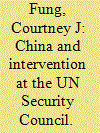

|
|
|
|
|
| Publication |
New York, Oxford University Press, 2019.
|
| Description |
xix, 282p.: tables, graphs, abbre.hbk
|
| Standard Number |
9780198842743
|
|
|
|
|
|
|
|
|
|
|
|
Copies: C:1/I:0,R:0,Q:0
Circulation
| Accession# | Call# | Current Location | Status | Policy | Location |
| 059801 | 341.2351/FUN 059801 | Main | On Shelf | General | |
|
|
|
|
| 2 |
ID:
191869
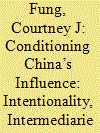

|
|
|
|
|
| Summary/Abstract |
According to popular accounts, China’s international influence is increasing with its growing material capabilities. However, researchers repeatedly demonstrate gaps between China’s power and its influence. Building on earlier research, we propose an inclusive approach to conceptualizing China’s influence abroad. Our approach conditions China’s net influence on three dimensions. First, intentionality distinguishes between intentional influence-seeking and influence that accrues unintentionally via influence externalities. Second, a systematic treatment of Chinese intermediaries–the diverse set of substate actors operating overseas–is needed in order to expand the study of Chinese influence beyond state-level behavior. Finally, domestic institutions in host countries are essential conduits for conditioning how the behavior of Chinese actors, as well as group and individual reactions within host countries, are aggregated up to the policy level.
|
|
|
|
|
|
|
|
|
|
|
|
|
|
|
|
| 3 |
ID:
143565
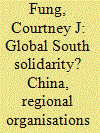

|
|
|
|
|
| Summary/Abstract |
Why was China responsive to regional organisations’ call for intervention in the case of the Libya crisis, where it supported sanctions and an International Criminal Court referral, and acquiesced to a no-fly zone, but unresponsive to pressure from regional organisations for intervention in the Syria crisis, issuing repeated vetoes instead? Using interviews and other primary data, this article explains the variation by highlighting that China is most responsive to regional organisations when these groups remain cohesive, congregate around the same policy position and when they publicly criticise or isolate China.
|
|
|
|
|
|
|
|
|
|
|
|
|
|
|
|
| 4 |
ID:
179293
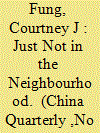

|
|
|
|
|
| Summary/Abstract |
Much has been written about China's active engagement and progressive approach to the “responsibility to protect,” a norm that reframes state sovereignty not as a right but as a responsibility. China's response to the “Report of the UN Commission of Inquiry on human rights in the Democratic People's Republic of Korea (DPRK),” which invokes the norm, however, challenges existing literature. China flatly refuses to uphold the responsibility to protect in the case of the DPRK, despite using previously supported standards to invoke the norm elsewhere and the report's dozens of consensual recommendations. This article is the first to systematically investigate how China has responded to the report. It shows that China's responses are shaped by its exceptionalism and concerns that the responsibility to protect could lead to regime change. I conclude with implications for the broader question of China's engagement with international norms in its near abroad. In my discussion, I draw on interviews with Korean and Chinese foreign policy elites, UN and US officials and DPRK human rights advocates, as well as primary and secondary documents.
|
|
|
|
|
|
|
|
|
|
|
|
|
|
|
|
| 5 |
ID:
165481
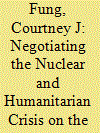

|
|
|
|
|
| Summary/Abstract |
This article describes a simulation scenario based on of-the-minute thinking about the Korean Peninsula crisis. The scenario highlights the tradeoffs and difficulties in addressing the nuclear and humanitarian crisis, tasking students to negotiate to reach consensus on track I and track II levels. Students are negotiators, gaining experience and exposure to key international relations and political science concepts through active learning. An optional media-teams and press-conference component also is discussed. The scenario, grading rubric, and supplemental materials are included to give instructors a resource that is easily modified across groups varying in size, ability, and composition.
|
|
|
|
|
|
|
|
|
|
|
|
|
|
|
|
| 6 |
ID:
188611
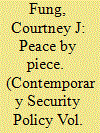

|
|
|
|
|
| Summary/Abstract |
How do states respond to peacekeeper fatalities? Peacekeeper fatalities incur costs for contributing states, leading to recalculations of whether voluntary troop deployments generate benefits. Yet it remains unclear how states with non-democratic regime types respond to peacekeeping troop fatalities, whether the ensuing foreign policy decision rests on tactical decisions to continue troop contributions to the mission, and if states affix the same costs to every peacekeeper fatality regardless of how the fatality occurs. This article builds upon existing studies with a detailed case study of China, a non-Western, non-liberal UN troop contributor. China only recently experienced peacekeeper fatalities by malicious acts, which prompted China to become an emerging policy leader regarding peacekeeper safety and security. China’s policy response highlights discomfort about accepting higher levels of danger as a given for UN peacekeeping, with implications for the debate on the robust use of force and China’s approach to international institutions.
|
|
|
|
|
|
|
|
|
|
|
|
|
|
|
|
| 7 |
ID:
170308


|
|
|
|
|
| Summary/Abstract |
A fundamental question facing global governance today is whether the UN peacekeeping regime can function with enough skilled troops to execute increasingly demanding and complicated mandates. The People’s Republic of China is informally thought of as a potential lead troop-contributing country. China typically deploys non-combat enabler troops, and recently began deploying combat troops, which may have to engage in live fire to defend the mandate. The risks and costs associated with dispatching combat troops challenge the benefits that China derives from supporting peacekeeping. I first establish China’s feedback mechanisms to facilitate simple and complex learning against China’s peacekeeping trajectory and motivations for participation. I then address the implications of China’s combat troop deployment, focusing on the UN Multidimensional Stabilization Mission in Mali and the UN Mission in South Sudan. The article draws insights from interviews with Chinese foreign policy elites and UN officials, and participant observation at the UN Department of Peacekeeping Operations.
|
|
|
|
|
|
|
|
|
|
|
|
|
|
|
|
| 8 |
ID:
173741
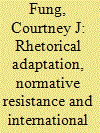

|
|
|
|
|
| Summary/Abstract |
How do rising powers execute normative resistance to shape international order? Contrary to the existing literature, I argue that rising powers are productive agents of normative change and international order-making, through the use of rhetorical adaptation to contest pre-existing orders. Rhetorical adaptation is a strategy and set of tactics that simultaneously modifies norm content, while reducing critiques of obstructionism. To make this argument, this article traces China’s efforts as a ‘norm shaper’ regarding the responsibility to protect through the inception, institutionalization and implementation of the norm in the landmark 2011 Libya intervention. China layers traditional sovereignty norms under the responsibility to protect, focusing and narrowing the emerging norm by fortifying the primacy of the state. While I show how China resists co-option into an evolving ontological order that challenges traditional sovereignty, the article also addresses the unforeseen consequences of China’s normative efforts that ‘backfired’ to permit the use of the responsibility to protect to justify Libyan regime change. More broadly, this article speaks to rising powers as agents crafting international order, and the process of normative resistance that occurs throughout the norm life cycle. I draw from publicly available documents and semi-structured interviews with Chinese foreign policy and United Nations elites.
|
|
|
|
|
|
|
|
|
|
|
|
|
|
|
|
| 9 |
ID:
192098
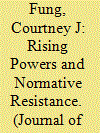

|
|
|
|
|
| Summary/Abstract |
What explains rising powers’ approach to emerging norms that challenge ontological order? The article uses a controlled comparison of two rising powers, China and India, as they address the responsibility to protect, which reconceives state sovereignty as contingent. Both states rejected the norm at its inception, before diverging as UN Security Council members during norm application in the Libya intervention. China assumed a creative resister role, offering tactical concessions, while using traditional sovereignty norms to renovate norm content. India assumed a norm begrudger role, typified by rhetorical rejection and disengagement from evolving normative discourse, coupled with practical support for the responsibility to protect. These rising powers’ normative roles are shaped by their dual status and differing positions within the UN Security Council social environment.
|
|
|
|
|
|
|
|
|
|
|
|
|
|
|
|
| 10 |
ID:
161258
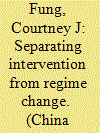

|
|
|
|
|
| Summary/Abstract |
China's response to the recent Syria crisis at the UN Security Council represents a crucial case in China's approach to intervention in that it breaks from China's recent practice of becoming more permissive regarding intervention. Instead, China actively worked to ensure that a firm line was drawn to separate intervention from foreign-imposed regime change. It did so by employing three diplomatic innovations: exercising multiple, successive vetoes; expanding discourse to delegitimize intervention as “regime change” by Western powers; and engaging in norm-shaping of the international community's “responsibility to protect” post-intervention. Together, these three innovations highlight China's desire to firmly separate the intervention norm from that of regime change. Using a variety of primary sources, the article also draws insights from interviews with foreign policy elites in Beijing, New York and New Delhi.
|
|
|
|
|
|
|
|
|
|
|
|
|
|
|
|
| 11 |
ID:
161171
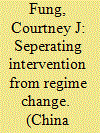

|
|
|
|
|
| Summary/Abstract |
China's response to the recent Syria crisis at the UN Security Council represents a crucial case in China's approach to intervention in that it breaks from China's recent practice of becoming more permissive regarding intervention. Instead, China actively worked to ensure that a firm line was drawn to separate intervention from foreign-imposed regime change. It did so by employing three diplomatic innovations: exercising multiple, successive vetoes; expanding discourse to delegitimize intervention as “regime change” by Western powers; and engaging in norm-shaping of the international community's “responsibility to protect” post-intervention. Together, these three innovations highlight China's desire to firmly separate the intervention norm from that of regime change. Using a variety of primary sources, the article also draws insights from interviews with foreign policy elites in Beijing, New York and New Delhi.
|
|
|
|
|
|
|
|
|
|
|
|
|
|
|
|
| 12 |
ID:
179816
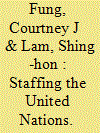

|
|
|
|
|
| Summary/Abstract |
A developing public commentary views China as exerting influence in international organizations to legitimize and disseminate PRC foreign policy values and interests. This article examines an understudied source identified by PRC elites to promote influence in the United Nations system: dispatching PRC nationals as international civil servants, specifically in a targeted pursuit of executive leadership positions. Using decades of UN staffing data, we find that apart from Russia, China holds the fewest executive leadership posts among the aspiring and permanent members of the UN Security Council. Moreover, China is yet to lead an agency addressing international security matters. US and European staff contributions are significantly higher at all staffing levels of the international civil service. Still, the data shows that China made modest, targeted gains in most specialized UN agencies, and agencies headed by PRC nationals show faster increases in PRC staff members, though all base numbers were low. We draw from Chinese-language sources to discuss issues facing China in increasing its international civil service numbers, affecting the country's ability to shape global governance.
|
|
|
|
|
|
|
|
|
|
|
|
|
|
|
|
| 13 |
ID:
147572
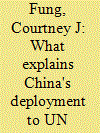

|
|
|
|
|
| Summary/Abstract |
What explains China's deployment to UN peacekeeping operations? Material factors are necessary but insufficient to explain China's calculus; identity is a key causal variable also. China is the only permanent UN Security Council member to claim dual identities as a great power and a Global South state in regards to peacekeeping and is therefore receptive to social influence from its respective peer groups. I apply competing explanations for deployment against the critical case of China's 2007 commitment to the UN-African Union Hybrid Mission in Darfur, a least-likely case for identity-based explanations. I use extensive interviews of Chinese and UN foreign policy elites, participant observation at the UN Department of Peacekeeping Operations, and written sources to reconstruct the case. The article concludes with reflections on rising powers and peacekeeping, and the implications on the scope conditions for identity as a variable in Chinese foreign policy and China's intervention behavior more broadly.
|
|
|
|
|
|
|
|
|
|
|
|
|
|
|
|
|
|
|
|
|